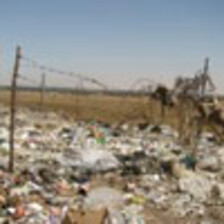The Electronic Intifada Rafah 18 October 2012

Workers at the Rafah plant sort waste for recycling
APA imagesFor the past 14 years, 120 tons of garbage has been dumped every day beside Sofa, a commercial crossing between Gaza and Israel. The dump reached capacity in 2005 but remains in use because the authorities have not found an alternative. Today, the mound of waste at Sofa is about 30 meters high.
As a response to the strip’s worsening environmental problems, Gaza has finally opened its first recycling factory.
Located just a few kilometers from the border with Egypt, the recycling plant serves Rafah, a city with 180,000 people, many of them Palestinian refugees. Built on a two acre site, it hosts a line of machines that stretch for 32 meters. They process both solid material and compostable food waste.
Abdelhamid Edhair, head of the sanitation and environment department for the Rafah municipality, said that the new plant is vital for the city.
“We have been unable to deal with complaints by residents near to the mound of solid waste [in Sofa],” he added. “The solid waste there leaves some environmental problems such as the spread of mosquitoes and a terribly bad smell,” he said. “It also releases methane gas, which is dangerous when it combines with oxygen as it causes some fires in the area, especially in the summertime. Due to the limited size of farmland in the Gaza Strip in general and in Rafah in particular, we cannot dispose the solid waste on other pieces of land,” he explained.
Arduous work
Wearing a protective mask over her mouth, Insherah Abu Jamous picked up empty plastic bottles from a conveyer belt. She is one of the 26 women working on the factory floor.
The work is arduous but Abu Jamous needs it to survive. “Frankly, my economic conditions are very bad as I am responsible for the welfare of eight children, the eldest of whom is 16 years old,” she said. “My husband has deserted us and married another woman, so I had to look for a work to take care of my own children.”
Organized into groups of four, Abu Jamous and her colleagues sort through the solid waste during daily shifts that run from 8am to 3pm.
Enas Abu Jame, an agricultural engineer who manages the plant, explained that the woman are employed on three-week contracts. Each woman is paid a total of $350. “Afterwards we will select another 26 women from impoverished households here in Rafah city, in order to allow others to benefit,” said Abu Jame.
Some of the women have learned about work opportunities at the factory run by Yabous, a local charity.
Um Mohammad is a 35-year-old single woman and graduate of business administration. “Since I graduated from university in 2002, I have been able to work only temporarily within temporary projects, provided by either local NGOs [non-governmental organizations] or local authorities but this has not been enough,” she said. “I applied with the Yabous NGO for this work, which is difficult, but definitely helpful to me.”
The plant is the brainchild of Samir al-Afifi, a university professor. “Once Samir al-Afifi managed to get an approval for his project proposal, we started contacting some local mechanics to design equipment we needed,” said Mohammad al-Neirab, an engineer at the factory, who is also a board member with Friends of the Environment Association, a group supporting the project.
Many components of the ten machines now operating at the factory were brought from Egypt via underground tunnels.
According to al-Neirab, the factory’s workers will transform food waste into organic fertilizer, which will be distributed free of charge to farmers. Some packs of fertilizer have already been prepared and are awaiting distribution.
Constraints
Despite the progress made at the factory, it is hampered by technological constraints. It does not have the equipment to recycle paper or sheets of metal. Al-Neirab hopes to export such waste to other countries, which have the capacity to recycle it.
For the time being a pile of paper and metal sits in one corner of the factory. While it is capable of processing more waste, the factory is handling just 50 tons per day.
“We need here to undertake environmental safety measures such as filling the floor of the factory with concrete,” al-Neirab added. “As you see, the floor is now made of sand. This will affect the water reserves in the area in the long run.”
With extra resources, al-Neirab estimates that the factory could handle daily loads of 250 tons and that it could serve the nearby area of Khan Younis, as well as Rafah. An additional hurdle to overcome is that Gaza is often beset by power failures as a result of the siege imposed by Israel.
The amount of waste produced daily in Rafah alone is between 120 and 150 tons, according to its municipality. Edhair cited estimates that a total of 1,000 tons of garbage is dumped every day throughout Gaza, much of it on farmland.
Along with providing sorely-needed employment, the new factory is helping to educate children about waste management. Yasser Ismail, a school teacher in Rafah, was visiting the factory with some of his pupils at the same time as The Electronic Intifada.
“This is such a wonderful project and we are proud that our town was the first to have a recycling plant in Gaza,” he said. “We hope that similar projects will be installed in other parts of Gaza, as this will help preserve our environment.”
Rami Almeghari is a journalist and university lecturer based in the Gaza Strip.





